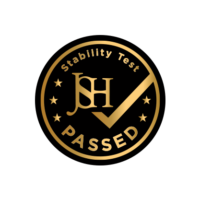You know that feeling when you’re running on empty—not just tired, but mentally foggy, physically drained, and somehow your digestion feels off too? Maybe it’s after a particularly stressful month at work, or following an intense training period, or even during a bout of illness when your body just doesn’t feel like your body anymore.
What many people don’t know is that there’s one amino acid that becomes increasingly important during these challenging periods. L-glutamine is the most abundant amino acid in your bloodstream, and research shows it plays multiple roles in your body—from supporting your intestinal lining to serving as fuel for certain immune cells.
Today, I want to share what the current research tells us about L-glutamine and why nutrition scientists consider it worth attention. We’ll look at the evidence, discuss what we know (and what we’re still learning), and explore why this amino acid has earned its place in quality wellness formulations.
Let’s start with the basics. L-glutamine is an amino acid—one of the building blocks your body uses to make proteins. But unlike some amino acids that you must get from food, your body is actually pretty good at making L-glutamine on its own. Your muscles produce it, your lungs make it, and it circulates throughout your bloodstream in higher concentrations than any other amino acid.
So why should you care about something your body already makes? Here’s where it gets interesting.
L-glutamine falls into a category called “conditionally essential” amino acids. Think of it like your body’s backup generator—most of the time, your internal production keeps up with demand just fine. But when life throws curveballs—intense physical stress, illness, major workouts, emotional stress, or even inadequate sleep—your body’s need for L-glutamine can outpace what it can produce.
During these times, your body starts pulling L-glutamine from wherever it can find it, primarily from your muscle tissue. It’s like your body is saying, “We need this amino acid for critical functions right now, and we’ll take it from wherever we can get it.”
This is completely normal and natural—your body is designed to prioritize survival and essential functions. But it also means that during challenging periods, having additional L-glutamine available through diet or supplementation might help meet that increased demand without depleting your body’s stores.
The name might sound technical, but L-glutamine’s role in your body is surprisingly straightforward. It serves as fuel for rapidly dividing cells—particularly those in your digestive tract and immune system—and acts as a nitrogen transporter, helping move this essential element where your body needs it most.
But here’s where L-glutamine becomes particularly fascinating: it’s not just a single-purpose nutrient. Research shows this amino acid wears multiple hats in your body, supporting different systems in ways that scientists are still discovering.
What makes L-glutamine particularly interesting is how it supports multiple systems throughout your body, often working behind the scenes in ways you might not immediately connect.
Gut Health Foundation
Your digestive tract is one of L-glutamine’s biggest consumers. The cells lining your intestines—called enterocytes—use L-glutamine as their primary fuel source. These cells have one of the fastest turnover rates in your body, completely replacing themselves every few days. To maintain this constant renewal, they need a steady supply of fuel, and L-glutamine is their preferred choice.
Think of your intestinal lining like a security barrier—it needs to let nutrients through while keeping unwanted substances out. When this lining is well-maintained, your digestion tends to function more smoothly. When it’s compromised, you might notice digestive discomfort or irregularities.
Your immune cells, particularly lymphocytes and neutrophils, also rely heavily on L-glutamine for energy. During times when your immune system is working harder—like during seasonal changes or periods of stress—these cells’ demand for L-glutamine increases significantly.
What’s fascinating is that your immune cells actually consume L-glutamine at rates comparable to glucose, even though glucose is typically considered the body’s primary fuel. This suggests just how important L-glutamine is for proper immune function.
Brain and Nervous System L-glutamine crosses the blood-brain barrier and can be converted into glutamate, a neurotransmitter involved in cognitive function. While your brain primarily runs on glucose, L-glutamine serves as an alternative fuel source and plays a role in maintaining proper nitrogen balance in brain tissue.
Some people report feeling mentally clearer when their L-glutamine levels are adequate, though individual responses can vary significantly.
During periods of physical stress—whether from exercise, illness, or life stress—your body’s tissues undergo repair and rebuilding processes. L-glutamine supports protein synthesis and helps maintain positive nitrogen balance, both important factors in recovery.
Athletes have long recognised L-glutamine’s role in recovery, though it’s worth noting that its benefits extend beyond just physical performance to general cellular maintenance and repair throughout the body.
The remarkable thing about L-glutamine is how these different functions interconnect. Better gut health can support immune function, adequate fuel for brain cells can help manage stress, and efficient recovery processes benefit your overall well-being. It’s less about L-glutamine being a magic bullet and more about it being a crucial component in your body’s interconnected systems.
But here’s what many people don’t realise: modern life has a way of increasing our L-glutamine needs while potentially limiting our body’s ability to keep up with demand.
Here’s the reality: our ancestors probably never had to think about L-glutamine deficiency. Their lives, while challenging in different ways, didn’t create the perfect storm of L-glutamine depletion that many of us face today.
Modern life has a unique way of increasing our L-glutamine needs while simultaneously making it harder for our bodies to keep up. Chronic stress—whether it’s work deadlines, financial pressures, or simply the constant mental stimulation of our connected world—puts continuous demands on our L-glutamine stores. Your body doesn’t distinguish between being chased by a predator and dealing with a difficult email thread; stress is stress, and it all requires resources.
Add intense exercise routines to the mix, and the demand increases further. While regular movement is beneficial, high-intensity training or endurance activities can significantly deplete L-glutamine levels as your muscles and immune system compete for available supplies.
Then there’s illness and recovery. Even common colds or minor injuries create increased L-glutamine demand as your immune system and healing processes kick into high gear. During these times, your body’s natural production might not keep pace with what’s needed.
Poor sleep compounds the problem. Quality rest is when your body does much of its repair and restoration work—processes that require adequate L-glutamine availability. When sleep is compromised, both the demand increases and the body’s ability to produce L-glutamine efficiently decreases.
You might notice this depletion as persistent fatigue that rest doesn’t seem to fix, digestive issues that come and go without a clear cause, or that general feeling of not quite operating at 100%. These aren’t necessarily signs of L-glutamine deficiency specifically, but they can indicate that your body’s recovery and maintenance systems are working harder than usual.
This is exactly why we made L-glutamine a key component of Microbion—to help bridge the gap between what modern life demands and what your body can naturally provide.
This is where L-glutamine’s reputation moves from theoretical benefits to documented clinical evidence. The research reveals clear areas where human studies demonstrate meaningful, measurable benefits.
Sickle Cell Disease: The Gold Standard Evidence
The most convincing human data comes from sickle cell disease research. In a pivotal Phase 3 trial—the gold standard for testing new treatments—published in The New England Journal of Medicine, researchers studied 230 patients with sickle cell disease who received either oral L-glutamine (0.3 g/kg twice daily) or a placebo for 48 weeks (Niihara et al., 2018). The results showed significantly reduced vaso-occlusive crises (the painful episodes that define much of sickle cell disease), fewer hospitalisations, and a reduced incidence of acute chest syndrome compared to the placebo.
This wasn’t a one-off finding—multiple real-world studies following patients for up to 120 weeks have consistently reported sustained reductions in complications (Elenga et al. 2022, 2023). The mechanism here makes biological sense: L-glutamine appears to improve the NAD redox potential in sickle red blood cells—essentially helping these fragile cells better handle oxidative stress, which contributes to cell sickling and subsequent complications. This research was compelling enough to earn FDA approval in 2017.
Post-Infectious IBS: Remarkable Recovery Rates
Another standout finding comes from gastrointestinal research. A well-designed study published in Gut examined patients with post-infectious irritable bowel syndrome—the type that develops after a severe intestinal infection—who also had increased intestinal permeability, meaning their gut barrier wasn’t functioning properly (Zhou et al. 2018). The results were striking: 79.6% of patients taking 5 grams of L-glutamine three times daily achieved clinically meaningful symptom improvements, compared to just 5.8% in the placebo group. The treatment also normalised intestinal barrier function, essentially helping to restore proper gut barrier integrity.
Critical Care: Strategic Benefits
In critical care settings, systematic reviews analysing multiple randomised controlled trials have found that parenteral glutamine supplementation (given intravenously as part of nutrition support) in carefully selected critically ill patients showed reduced hospital mortality and trends toward fewer infections and shorter hospital stays (Wischmeyer et al. 2014). A focused analysis of surgical ICU patients demonstrated significant infection reduction and shorter hospital stays with appropriate glutamine supplementation (Pimentel & Fernandes 2020).
The key insight here is patient selection and timing—benefits are most apparent in stabilised surgical patients receiving appropriate doses as part of their nutritional support, rather than as a blanket intervention for all critically ill patients.
The Clinical Reality
These studies represent thousands of patients across different conditions, consistently showing that L-glutamine can provide meaningful clinical benefits when used appropriately. What’s particularly compelling is that these benefits align with our understanding of L-glutamine’s biological roles—supporting rapidly dividing cells, maintaining barrier function, and providing fuel for immune cells during times of increased demand.
Your Next Step: Making L-Glutamine Work for You
L-glutamine represents one of those rare supplements where the science actually backs up the promise. From the FDA-approved benefits for sickle cell disease to the dramatic gut barrier restoration in post-infectious IBS, the research demonstrates that this amino acid can deliver measurable improvements when your body needs it most.
The key insight from all this research is consistency over intensity. While clinical trials used high therapeutic doses, the underlying principle remains the same: your body benefits from steady, reliable L-glutamine availability. During periods of stress, intense training, poor sleep, or digestive challenges, your natural production simply can’t keep pace with demand. This is where thoughtful supplementation bridges the gap.
Timeline Expectations
Most people notice initial benefits within 2-4 weeks of consistent daily use. Gut-related improvements often appear first—better digestion, less bloating, more regular bowel movements. Energy and recovery benefits typically follow in weeks 4-6 as your body’s glutamine stores stabilize and cellular functions optimize.
The Daily Commitment
The research consistently shows that benefits come from sustained use, not sporadic supplementation. Think of L-glutamine less like a quick fix and more like a foundational nutrient that supports your body’s repair and maintenance systems. When taken consistently, it helps ensure your rapidly dividing cells—from your gut lining to your immune system—have the fuel they need to function optimally.
The Microbion Advantage
This is precisely why we made L-glutamine one of the 14 carefully selected ingredients in Microbion. Rather than relying on L-glutamine alone, we’ve combined it with complementary compounds that work synergistically to support your body’s natural processes. While L-glutamine provides the foundational cellular fuel, the other ingredients in Microbion enhance absorption, support the gut microbiome, and provide additional pathways for optimal wellness. It’s the difference between taking isolated nutrients and providing your body with a comprehensive support system.
L-glutamine isn’t magic, but when combined thoughtfully with other research-backed ingredients, it becomes part of a more complete approach to daily wellness. The science is there. The question is whether you’re ready to give your body this fundamental support.

Copyright 2024 © Mountaindrop. All rights reserved. Powered by EOSNET









